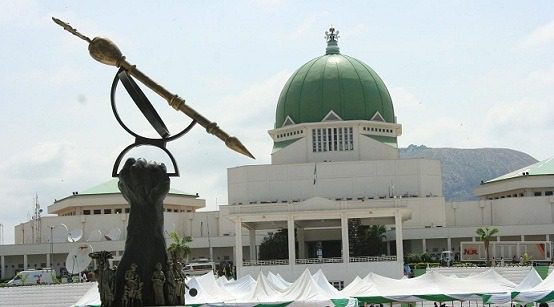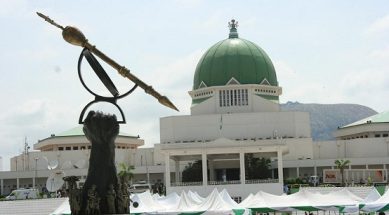Political Issues
Still on the 8th House Legislative Agenda -By Abiodun Fadeyi


The Nigerian National Assembly
After a keenly contested battle for the position of the Speaker of the House of Representatives, it is apparent the lower chamber of the National Assembly has finally settled for the legislative business which Nigerians voted them for in the last general election. The recent passage of the eighth House of Representatives Legislative Agenda (2015-2019), which was unanimously adopted by the House with Yakubu Dogara and Yussuff Sulaimon Lasun as the Speaker and Deputy Speaker respectively, Nigerians are set to witness robust legislative proceedings full of political intrigues. The numerical strength of the Peoples Democratic Party as a minority party will make the eighth House of Representatives interesting.
The new Legislative Agenda takes its bearing from the last House leadership under Aminu Tambuwal, who through the instrumentality of the seventh Legislative Agenda was able to stabilise the House to a large extent. The eighth House is therefore set to consolidate on the achievements of the last House and surpass it.
Taking a close look at the newly adopted Legislative Agenda, its position on national issues and legislative matters as they affect the growth and development of Nigeria, one cannot but commend the House. It has promised Nigerians better legislation and representation that will help speed up development and reforms that will work for the interest of the public. As an institution saddled with making laws, the House has promised to respect and protect the rights of Nigerians and to operate with accountability and transparency.
In view of this, some areas of interest in the legislative agenda as passed by the Green Chamber are worth mentioning. The public perception of Nigerian legislators and other public institutions of government recently has not been encouraging. As such, the House is set to correct the negative perception concerning the parliament and public institutions as the passage of the Legislative Agenda is set to build a responsive and responsible legislature based on integrity, transparency, and accountability.
It aims at bequeathing to Nigerians a House that will use constitutionality to fight the cause of the citizens. Most critically, the House in the approved Agenda has resolved to legislate on matters that will promote equality among the citizens and ensure the protection of the rights of Nigerian women, youths and the vulnerable in the society.
The country is presently experiencing economic difficulties while youth unemployment is on the increase; so also is the level of poverty. Against this backdrop, the eighth House of Representatives will play its part by working closely with the Executive to legislate on bills that will help eradicate poverty and other social problems facing the nation.
The primary responsibility of a legislator is to make laws for the growth and development of the nation as enshrined in the constitution. The House is committed to working closely with the Executive regarding the passage of the nation’s budget by the National Assembly. The House has equally taken a zero tolerance stance on corruption and is set to use the instrumentality of its legislative power under Sections 88 and 89 of the constitution to expose corruption, waste in the conduct of government business, and inefficiency.
Another interesting aspect of the Legislative Agenda is the mode of communication with the public. The House has promised to open itself up to the scrutiny of the general public regarding its expenses and emoluments of its members. To me, this is one contentious and vital issue which has been in the public domain for some time now. Thus, it is a welcome development that the new House leadership has promised to make information available to the public regarding how much they earn as salaries and allowances.
The use of ICT for legislative activities is also a welcome development. In view of globalisation, most parliaments in the world today have adopted the e-parliament platforms and e-voting systems for transparency and accountability when it comes to voting on national issues on the floor of the House, and on other legislative matters.
Instructively, the House of Representatives will put in place measures to promote economic growth and development through a robust legislation against the culture of non-remittance of internally generated revenue amongst the Ministries, Department and Agencies of government. It shall take legislative measures under constitutional provisions on revenue generation and remittance to ensure compliance to the rule by the MDAs.
Also, the House of Representatives will support the efforts of the Federal Government through legislation for the development of the North-East and the Niger Delta by delivering special economic measures that will address the fundamental causes of problems in the areas and address challenges of insecurity and terrorism in the North-East which have led to so many people being internally displaced in Nigeria.
In the case of the Niger Delta, given that initiatives such as the derivation fund in the revenue allocation formula, the Ecological Fund and Amnesty Programme, creation of the Niger Delta Development Commission and Ministry of Niger Delta Affairs, have not solved the environmental pollution, poverty and infrastructural decay in the area. The House has promised to ensure legislative compliance by conducting oversight functions on all the MDAs in the Niger Delta Ministry to address these lingering challenges.
The legislative framework adopted by the House will go further to guide it in its conduct and it will also enhance Executive-Legislative relationship as it has promised to transmit a copy of the adopted agenda to the President for his information and necessary collaboration. As the eighth House of Representatives settles down to its legislative duties, Nigerians are watching and hoping that the present House will bring about the desired change they are yearning for.



















